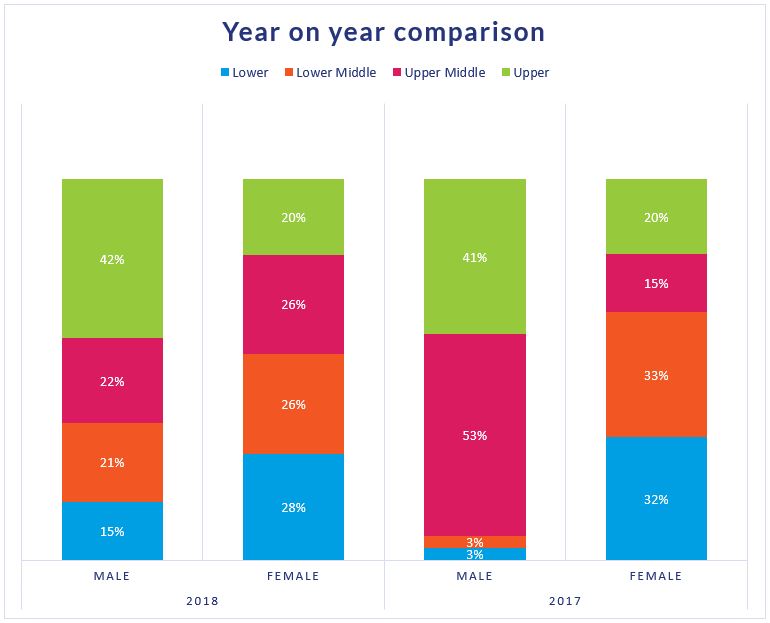Gender pay gap report
KIMS Hospital is committed to creating an environment, which will attract, retain and motivate its people, by enabling a culture in which individuals are able to make best use of their skills, free from discrimination or harassment, and in which all decisions are based on merit.We are an equal opportunities employer, committed to the health and wellbeing of all our people. We believe that it is our people that make our hospital successful and everyone should have the opportunity to work in a motivated team, free from discrimination on any grounds.
We are committed to ensuring that we operate a pay and reward scheme that is competitive, transparent and fair. We aim to ensure we eliminate discrimination and reward the skills, experience and potential of all our employees.
“Gender Pay not Equal Pay”
A gender pay gap is a measure of the difference in the pay of men and women in an organisation, regardless of the nature or level of their work.
It is different from an equal pay comparison, which involves a direct comparison of people or groups carrying out the same work or work of equal value.
Our intention is to close any gap where it exists. To support us in doing this, it is important to understand where we sit in our industry as a starting point.
Our Industry
The working population of England is split nearly 50/50 between men and women. However, this is not reflected in the healthcare industry which is broadly 77% female and 23% male.
Our population reflects the healthcare industry, with us employing more women than men. However, it is important to note that 60.4% of our team leaders through to our senior management team are female. In comparison we do not receive many applications from male applicants for the lower quartile roles and therefore this is part of our action planning.
This follows the national data that there is a challenge across the sector on how to attract more men into lower quartile type roles (e.g health care assistant and support roles).
What’s encouraging for KIMS Hospital is 98% of our staff are highly engaged in the work they do as shown in our annual Staff Survey of which 81% of staff participate. We are committed to closing the gender pay gap, and set out in this report the steps we have already taken in relation to this, in addition to the steps we will be taking over the next 5 years.
Year on Year Comparison
We have taken a number actions over the last year, which has already resulted in a significant change in the quartile results below. This year, 2018, we have a much more equal spread of women across every quartile and our male population are distributed more evenly across all quartiles. In the first year, 2017, the majority of men sat in the two upper quartiles and women were predominately in the lower two.
As reflected in healthcare industry data, we typically receive much greater numbers of female applicants for our lower quartile roles such as housekeeping assistant, customer services administrators and ward clerks, and therefore employ a majority of females in these roles.
For our higher salary roles, our split between male and female is more balanced, though there are a higher number of females in these roles. As our Board has more males our data reflects this weighting.

How can we improve our gender pay gap? Our commitment
Attraction
- As certain roles tend to attract certain genders, we will focus on our recruitment advertising campaign for these roles so that we can make the role appeal to both genders.
Work life balance
- Our flexible working policy is open to all colleagues, we need to highlight and reinforce to our teams our flexible working policy as well as shared parental leave. We have identified that the majority of our part time employees are female and therefore we need to raise awareness that flexible working is available to both genders.
- We are trialling flexible working practices for senior women to ensure we retain our female talent.
- Continue to promote our annualised hours and ‘bank’ work options.
Company Policies
- We regularly review out policies and look for opportunities to further support colleagues balance their work and home commitments
- We have implemented an Equality, Diversity and Inclusion Strategy
Training & Development
- Implement unconscious bias training to all team leaders to ensure our recruitment and hiring processes are free from bias.
- Implement Imposter training for female employees who wish to develop their career.
- We will continue to invest in our Leadership and Coaching culture to support and development our leaders within KIMS Hospital
- We continue to build on our apprenticeship pathways, which will help, encourage and promote internal progression.
Reward & Recognition
- Continue to develop our reward and recognition packages that attract the best people regardless of gender.
Review
- We monitor all Equality data at our monthly committee meetings and are starting to monitor gender pay. This data is also shared with the Hospital Board.